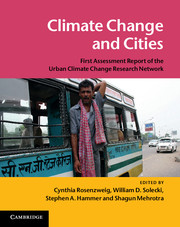Book contents
- Frontmatter
- Contents
- Foreword – Anna Tibaijuka
- Foreword – Rajendra Kumar Pachauri
- Foreword – Mayor Michael R. Bloomberg
- Foreword – Jeffrey D. Sachs
- Preface
- Executive Summary
- Part I Introduction
- 1 Urban climate change in context
- Part II Defining the risk framework
- Part III Urban sectors
- Part IV Cross-cutting issues
- Conclusion: Moving forward
- Appendix A City case studies and topics in vulnerability, adaptation and mitigation
- Appendix B Acronyms and abbreviations
- Appendix C Steering Group, ARC3 authors, and reviewers
- Index
- References
1 - Urban climate change in context
Published online by Cambridge University Press: 05 August 2012
- Frontmatter
- Contents
- Foreword – Anna Tibaijuka
- Foreword – Rajendra Kumar Pachauri
- Foreword – Mayor Michael R. Bloomberg
- Foreword – Jeffrey D. Sachs
- Preface
- Executive Summary
- Part I Introduction
- 1 Urban climate change in context
- Part II Defining the risk framework
- Part III Urban sectors
- Part IV Cross-cutting issues
- Conclusion: Moving forward
- Appendix A City case studies and topics in vulnerability, adaptation and mitigation
- Appendix B Acronyms and abbreviations
- Appendix C Steering Group, ARC3 authors, and reviewers
- Index
- References
Summary
Introduction
Cities, as home to over half the world's people, are at the forefront of the challenge of climate change. Climate change exerts added stress on urban environments through increased numbers of heat waves threatening the health of the elderly, the ill, and the very young; more frequent and intense droughts and inland floods threatening water supplies; and for coastal cities, enhanced sea level rise and storm surges affecting people and infrastructure (Figure 1.1) (IPCC, 2007). At the same time, cities are responsible for a considerable portion of greenhouse gas emissions and are therefore crucial to global mitigation efforts (Stern, 2007; IEA, 2008). Though cities are clearly vulnerable to the effects of climate change, they are also uniquely positioned to take a leadership role in both mitigating and adapting to it because they are pragmatic and action-oriented; play key roles as centers of economic activity regionally, nationally, and internationally; and are often first in societal trends. There are also special features of cities related to climate change. These include the presence of the urban heat island and exacerbated air pollution, vulnerability caused by growing urban populations along coastlines, and high population density and diversity. Further attributes of cities specifically relevant to climate change relate to the presence of concentrated, highly complex, interactive sectors and systems, and multi-layered governance structures.
- Type
- Chapter
- Information
- Climate Change and CitiesFirst Assessment Report of the Urban Climate Change Research Network, pp. 3 - 12Publisher: Cambridge University PressPrint publication year: 2011
References
- 22
- Cited by



